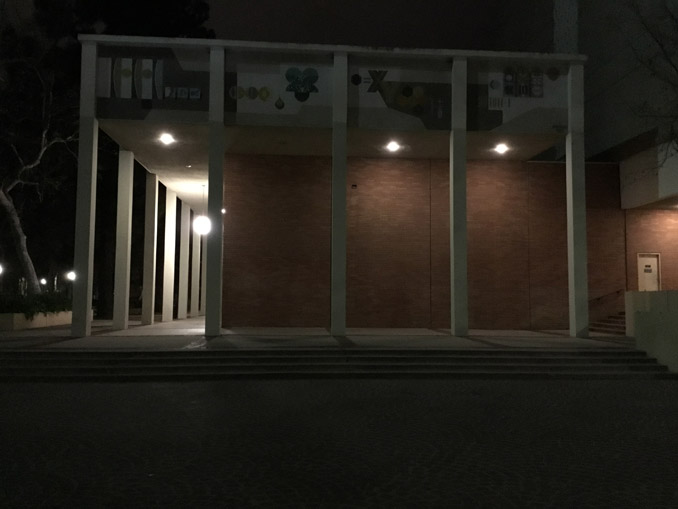The Apple iPad Pro Review
by Ryan Smith, Joshua Ho & Brandon Chester on January 22, 2016 8:10 AM ESTCamera
While it’s pretty much a universally terrible idea to use a tablet as your primary camera, for something like video chat or in an emergency it’s better to have one than not. In the case of the iPad Pro, the camera is essentially identical to what we saw with the iPad Air 2, which is to say an 8MP 1.1 micron 1/4” sensor, with an F/2.4 aperture and 3.3mm focal length, which translates to a 35mm equivalent focal length of 31mm. There’s no PDAF or anything fancy going on here, so it’s pretty much a guarantee that the camera is the exact same module that we saw with the iPad Air 2. The front facing camera is still a 1.3MP F/2.2 2.65mm focal length module, which leads me to believe that it too is shared with the iPad Air 2. I honestly don’t see any difference between the iPad Air 2 and iPad Pro cameras, so rather than spending time dwelling on those this comparison will be focused upon how it compares to popular smartphones and the tablet competition. As I don’t have a tripod mount that can actually fit the iPad Pro, I’ve elected to forgo some of our standard latency tests to avoid presenting data with confounding variables.
| Daytime Photography Scene 1 |
In our first daytime scene the iPad Pro is actually not that far off from the iPhone 6s. If you look closely it’s obvious that there is less detail to be seen, but it’s honestly quite difficult to see the difference. Relative to the iPhone 6, detail is almost identical. For a camera that should basically be never used for the kinds of photos I’m taking for this review, the camera will work well in a pinch. By comparison the Pixel C is rather disappointing. Even in this ideal condition, detail is visibly worse when compared to the iPad Pro. I’m not sure whether this poor showing is caused by camera shake or AF issues but in general the AF system for the Pixel C had some pretty noticeable issues in general. There are also some obvious problems with color noise despite base ISO, which is shocking.
| Daytime Photography Scene 2 |
In the interest of trying to collect more than one data point for presentation in the review, I tried another scene. Once again, the iPhone 6s shows a minor resolution lead and the iPad Pro is pretty close to the iPhone 6 here. By comparison while there isn’t any obvious weirdness going on the Pixel C clearly has less detail and a noticeable amount of color noise, which is surprising even for a tablet camera. Color noise is one of the most distracting things in any photo, so I’m always concerned when any mobile device has a camera where the JPEG output shows color noise.
| Low Light Photography Scene 1 |
| Low Light Photography Scene 2 |
Moving on to the low light testing, we clearly see the disadvantage that comes with smaller pixel sizes. The iPad Pro is just clearly worse than the iPhone 6 and 6s here. The 6s Plus is the clear winner of this test. While the iPad Pro has dark output, it’s miles better than the Pixel C and Nexus 9, both of which show enormous amounts of color noise. The Tegra X1 and K1 ISP for whatever reason is struggles with doing things like hot pixel compensation in low light, as in the dark areas of the photo there are obvious bright speckles of pixel noise.
| Low Light Photography Scene 3 |
In another low light scene we see the same sort of ordering that was in the previous scene. The iPad Pro is acceptable here, but the iPhone 6, 6s, and 6s Plus are all clearly superior. However, the iPad Pro is clearly superior to the Pixel C and Nexus 9 on the basis of better detail and noise reduction. Unlike most smartphones I don’t really see a huge difference in how well everything freezes motion here, but I suspect this might just be because the entire image for the Pixel C and Nexus 9 is so lacking in detail.
Video
| 1080p30 Video |
Looking at video performance, the iPad Pro noticeably lags behind the iPhone in feature set, which isn't entirely unsurprising given that the camera on any tablet should be strictly reserved as a fallback for when you can’t get to a smartphone or literally anything else. 1080p30 is encoded with H.264 high profile at 17 Mbps, with around 82 Kbps single channel AAC audio. For the most part, quality here is actually comparable to the iPhone 6 and 6s in daytime, with a noticeably tighter crop due to the longer 35mm equivalent focal length. The iPhone 6s Plus is again the obvious winner here though, due to its use of OIS in video. By comparison, the Pixel C shows clearly less detail, and the higher contrast leads to worse detail in areas like the road and in shadows.
| Slow-Motion Video |
In 720p120, the iPad Pro is clearly worse than the iPhone 6s and 6s Plus just by virtue of not supporting 1080p here. That's not exactly surprising, but as a result the quality looks to be roughly comparable to the iPhone 6. Given that both are using H.264 high profile at 30 Mbps it’s not exactly a surprise though. The Pixel C and Nexus 9 are both unable to participate in this test at all as they don’t support slow motion video, which might be an ISP limitation of some sort as we’ve seen Nexus devices on the smartphone side with support for slow motion video.
Overall, camera performance on the iPad Pro is probably as good as it gets for tablets, but it's obviously not competitive with the best smartphones. No one should really be surprised that this is the case though, as tablets are basically cameras of last resort, while smartphones are often primary cameras now.
Misc.
On the WiFi side unfortunately I have reason to doubt the validity of our current testing methodology, especially on iOS. As a result for this review we won’t be running any particular benchmarks for the iPad Pro but I never saw any particular issues with WiFi performance on the iPad Pro, which uses Broadcom’s BCM4355 WiFi/BT combo chipsets.
I also don’t have any particular equipment to really test speaker quality to its full extent, but subjectively the speakers are some of the best I’ve ever experienced on a mobile device in terms of sheer volume and frequency response. The speaker amps are shared with the iPad Air 2, which is Maxim Integrated’s MAX98721 IC. The audio codec/DAC is Cirrus Logic’s CS42L81, which isn’t entirely unsurprising given how most every Apple mobile device seems to use a Cirrus Logic codec of some sort.
I also found a number of interesting design wins, which include TI’s BQ27540 for the battery fuel gauge, and an MCU related to the Orion dock that seems to handle accessories like the Smart Keyboard. This MCU is connected over i2c, with some suggestion that this connector can act as a USB port, but I haven’t been able to figure out much else about this system.















408 Comments
View All Comments
MaxIT - Saturday, February 13, 2016 - link
Reality check: the "nonplussed" product sold more than the well established surface pro in the last quarter.... So maybe you are just expressing YOUR opinion, and not "everyone's "....lilmoe - Friday, January 22, 2016 - link
The performance is "great" for iOS, FTFY. It would suffer on anything "Pro"....ddriver - Friday, January 22, 2016 - link
Performance is better than a high end workstation from 10 years ago, a system which was capable of running professional tasks which are still nowhere to be found on mobile platforms. And it has nothing to do with performance. It has to do with forcing a shift in the market, from devices used by their owners to devices, being used by their makers to exploit their owners commercially. And professional productivity just ain't it. Not content creation but content consumption. People flew in space using kilohertz computers with kilobytes of memory, today we have gigahertz and gigabytes in our pockets, and the best we can do with it is duck face photos. That's what apple did to computing, and other companies are getting on that train as well, seeing how profitable it is to exploit society, it is in nobody's interest to empower it.Phantom_Absolute - Friday, January 22, 2016 - link
I just created an account here to say...well said my friendlilmoe - Friday, January 22, 2016 - link
I was trying really hard to understand what you were trying to say.Computers didn't get us to the moon. They sure helped, a LOT, but it was good ole rockets that did.
Anyway, point is (and I exaggerate), even if you shrink the latest 8 core Xeon E3 coupled with the fastest Nvidia Quattro into a 3-5W envelope and stick in an iPad, it won't make it anything close to a "Pro" product. It's about overall FUNCTION.
An iPad "Pro" with a revamped version of iOS, more standard ports, and a SLOWER SoC would be a much better "Pro" product than what we have here.
Even Android sucks for Pro tablets. Only Microsoft has a thing here.
ddriver - Friday, January 22, 2016 - link
What I am trying to say is mobile hardware IS INDEED capable of running professional workloads. Of course it won't be the bloated contemporary workstation software, but people have ran workstation software on slower machines than that, and it was useful. So yes, this device has enough performance for professional tasks. There is no hardware lacking, only the software is.I can assure you, no matter how many rockets you have, you will never reach the moon absent computer guidance. The rocket is merely power, but without control, power never constructive and always destructive.
lilmoe - Friday, January 22, 2016 - link
"There is no hardware lacking""The rocket is merely power, but without control, power never constructive and always destructive"
You seem convinced that you can be productive on a screen with only a fast SoC attached. I don't know where to start.
With all due respect, your analogies are ridiculously irrelevant (hence why I was having trouble understanding them). Workstations in the past had much more FUNCTION that any iPad today. IT'S NOT ONLY ABOUT THE COMPUTING POWER. These workstations, despite lacking power by today's standards, were built with certain function in mind, and were used for their intended tasks.
iPads are consumption devices, first and foremost. Apple did nothing for "computing", but they did a lot for consumerism. iDevices got popular because they addressed consumption needs by lots of consumers that they didn't even know they needed/wanted, I'll give them that. But Apple's *speed* of forcing "new technology" on people's throats, and turning perfectly functional products unusable is unprecedented, and bad. Your "Pro" device is NO exception, and isn't going to last, nor function, as long as the _workstations from 10 years ago_...
The Pro moniker is being abused. What does it even mean now? Relative speed? Function? Value? Multiple products in one? I don't know anymore. But I'd like to believe that Microsoft's definition of a Pro products sounds easier on my ears.
You seem to be extremely sold on marketed idea that disposable technology with a timed bomb to obsolescence is a good thing. Technology that does nothing but harm the industry and its consumers. To each their own I guess.
ddriver - Friday, January 22, 2016 - link
You are ridiculously ignorant. Both a workstation from 10 years ago and this product are in terms of hardware general purpose computers. What specifies one as a workstation and another as a content consumption device is the software that runs on that general purpose computer. A 10000$ contemporary workstation would only be good for content consumption without the workstation grade software. Much the same way that this device can be good enough for workstation use with the proper software. Once again, clean up your ears - there is no limitation on a hardware level. It is all about the software.Your problem with understanding my analogies stems from the fact you are a narrow minded person, and this is not an insult but a sad fact, most propel are, it is not your fault, it is something done to you, something you are yet to overcome. You are not capable of outside the box thinking, you are conceptually limited to only what is in the box. Why is why you perceive outside the box opinions as alien and hard to understand.
lilmoe - Friday, January 22, 2016 - link
lol, I should really convert to the Apple religion just to stop being ignorant. Take care man.ddriver - Friday, January 22, 2016 - link
You should just sit down and carefully reevaluate your whole life, I mean if "apple religion" is what you were able to take out of all the apple bashing I went through :D Since you obviously missed that obvious thing, let me put it out directly - I am criticizing apple for crippling good hardware to useless toys.